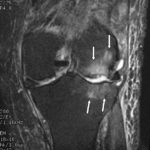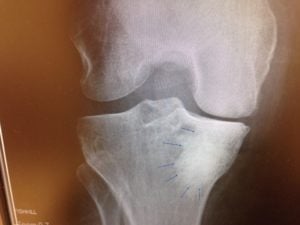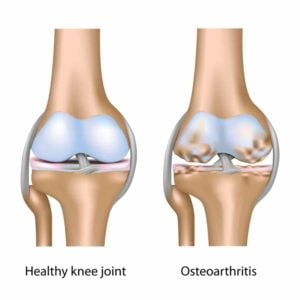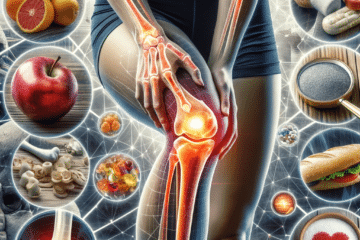
Bone Marrow Edema sounds scary. Many people come into the office with their MRI reports and worry that something is wrong with their bone marrow.

Bone Marrow Edema is simply a condition where fluid is found within the bone. That’s it. It’s a very non-specific finding. In the vast majority of circumstances it is not dangerous. Like our muscles after a long run or our joints if they are wearing out, the bone can become sore too. In the picture to the right, you are looking at a knee, and the arrows are pointing to the fluid in the bone, or bone marrow edema. Bone marrow edema can however be very painful.
What Causes of Bone Marrow Edema?
Bone marrow edema occurs for three main reasons.
- The first is trauma. If you suffer a significant injury something may hit your bone, or the two bones might be crushed together. Either way, the bones will not be happy. They will develop fluid within them in response to the injury. Bone, in that respect, is not very different from our other tissues like muscles which collect fluid after an injury.
- The second most common cause of bone marrow edema is osteoarthritis.
In a healthy knee, the bones are covered in cartilage. In an arthritic knee that cartilage has become thin, or absent. In that situation, the bone is under more stress. If the stress exceeds the capacity of the bone to support the weight then a stress reaction, or stress fracture occurs. That stress reaction or fracture shows up as bone marrow edema.
- “Osteonecrosis”: Osteonecrosis literally means “bone death”. That means that a small blood vessel in the bone was choked off somehow, and a small piece of bone dies. It is not as catastrophic as it sounds, but it produces a lot of bone marrow edema… and it can be quite painful.
Does Bone Marrow Edema Hurt?
When your muscles are injured, and fluid collects in the muscle — the muscle will swell. You have all had this at one time or another. Well.. bones are hard. Bones can not swell. So if there is fluid in the bone, the pressure inside the bone goes up. When the pressure in the bone rises because of the bone marrow edema, severe pain will occur. For those of you who have had a tooth abscess … that is what pressure pain feels like.
In many patients with osteoarthritis, especially those of you with very little swelling in the knee, it is likely that the bone marrow edema is bothering you more than the osteoarthritis, or inflammation in the knee joint. Usually, a physical exam will show that you are more tender over the bone, as opposed to being tender over the joint where the two bones meet.
Does Bone Marrow Edema Need to be Treated?
After trauma, the bone marrow edema will subside on its own. Just like most any other bruise you have had. In osteonecrosis, the bone marrow edema will also subside. In many cases of osteonecrosis, the bone will grow new blood vessels and regrow itself. Sometimes the area involved is too large, and it may not regrow. Osteoarthritis, on the other hand, is a progressive condition. Sadly, it only gets worse over time. That means that the edema in the bone is unlikely to improve either. In cases of severe pain that are thought to be due to bone marrow edema, certain treatments might improve your pain dramatically. Therefore treatment is not always necessary for bone marrow edema, it depends on the cause of the edema and the severity of your pain.
How is Bone Marrow Edema Treated?
The initial treatment of bone marrow edema is not very different from the treatment of most bruises. Rest, ice, medications, activity limitation, and possibly a crutch or a cane. In cases of trauma, and many cases of osteonecrosis, that will suffice. In patients with bone marrow edema due to osteoarthritis, the pain might not improve on its own. If your pain has not improved and your quality of life is suffering, you may prove to be a candidate for a procedure known as a “Subchondroplasty”.

During a subchondroplasty, we use an X-ray machine to find the area of bone where the edema is. A small needle is placed into the bone (under sedation), and a paste is injected. That paste will harden shortly after the procedure. Once the paste has hardened, it will give the bone significantly more strength. By improving the strength of the bone, it will enable the bone to deal with the added stress due to the osteoarthritis. If the procedure is successful, and the bone is stronger, then the bone marrow edema will subside. Once the bone marrow edema subsides, your pain should improve dramatically. The early clinical trials and our experience show this to be a safe and effective procedure. Of course, complications can arise, so you will need to determine if the potential risks are worth it. We need more research, and more time to determine if this could be a long term solution for pain due to bone marrow edema.
 In a healthy knee, the bones are covered in cartilage. In an arthritic knee that cartilage has become thin, or absent. In that situation, the bone is under more stress. If the stress exceeds the capacity of the bone to support the weight then a stress reaction, or stress fracture occurs. That stress reaction or fracture shows up as bone marrow edema.
In a healthy knee, the bones are covered in cartilage. In an arthritic knee that cartilage has become thin, or absent. In that situation, the bone is under more stress. If the stress exceeds the capacity of the bone to support the weight then a stress reaction, or stress fracture occurs. That stress reaction or fracture shows up as bone marrow edema.













I am in need of a knee replacement due to OA my knee is severe and my weight is way over what is allowed for a TKR. I have severe calf pain and i mean severe to the point where the only partial relief I get is from Percocet and bedrest.. I have bone marrow edema and am wondering if I would be a candidate for subchondroplasty and or PRP injections until I am at a better weight. I am in a catch 22 situatrion as i am unable to exercise to the degree needed to lose the weight but can’t go on with this severe pain. The pain I have in my calf pulsates down into my foot at time and is something that takes your breath away it hurts so much. I have known bad pain in my life but nothing like this. Help Please??? I am unable to take NSAIDS due to kidney issues. (stage 2) Thank You!
Michelle… All I can say is it is possible. I would need to see you, and your imaging studies.
Howard Luks
I got my knee twisted in starting of december 2013, leading to extreme pain, which later subdued by taking medicines..now its been 6 months but my knee still hurts when I try to do any strenous activity like jogging, climbing stairs without wearing a knee cap..I got a M.R.I of my knee which says..Subtle Marrow Edema seen in lateral femoral condyle anteriorly… can you please suggest some treatment or about this injury..Thank you!
It depends on why the edema is there. It may be part of an arthritic process, or the result of an injury — or even a combination of the two.
I started having knee pain 6 months ago and was diagnosed with BME 3 months ago. I never suffered from arthritis pain in my knees previously but do have pretty severe osteoarthritis in my hands. I am now having calf pain that gets severe after any activity -even a shopping trip seems to increase the discomfort. Is this calf pain due to the BME or as one doctor suggested, I am probably stressing muscles because my irregular gait. My orthopedist seems to think that time, ice and exorcize is all that is needed. I’m beginning to doubt this assertion.
HI Pat… It is sometimes hard to prove whether or not the BME is the source of your pain. Only a good exam can help. I’m sorry I won’t be able to comment further.
Howard Luks
What can be done about chronic subcortical bone marrow odema? i have had three bouts in 2 years and everytime I go off the crutches it comes back again? I do have rheumatoid arthritis.It is very painful.
kind regards
HI Natalie… It depends on whether or not your exam shows that the edema might or might not be the source of pain. A procedure called a subchondroplasty might help alleviate the pain if you and your surgeon feel the pain is coming from the bone itself, and not the joint.
I just had the procedure done 2 days ago and am curious about the recovery. I have previously had 6 surgeries on this knee, including a lateral release and micro fracture 2 years ago. The pain associated with this is worse than anything I have ever had following previous surgeries. Is that because they drill into the bone? How long does the extreme pain last? This is my Dr’s first so he really can’t answer my question. Thank you in advance for any help with this.
It does vary for many Andi. Most have pain for a few days to a week, and then an ache that tends to subside over the next 3-4 weeks. The pain is usually due to the pressure of having the injection placed into the bone. The holes are typically not the issue.
Good Luck !
Howard Luks